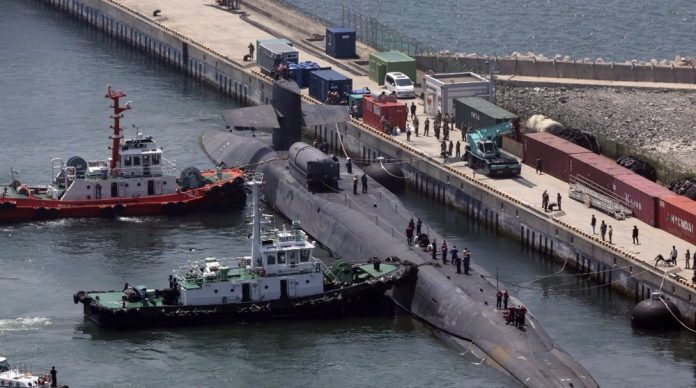South Korea welcomes the arrival of a US nuclear submarine a day after North Korea fired two ballistic missiles into Japan’s exclusive economic zone (EEZ) in the waters off Ishikawa Prefecture, a US nuclear-powered guided-missile submarine made its dramatic return to South Korea on Friday for the first time in nearly six years, according to the Seoul Defense Ministry.
The 18,000-ton USS Michigan submarine, which can conduct strike missions using Tomahawk cruise missiles, docked at a naval base in Busan, the ministry said, fulfilling a pledge by the U.S. to enhance the “regular visibility” of strategic assets — some of the United States’ most powerful weapons — on the Korean Peninsula.
read more: US-South Korea recent nuclear deal destabilizes region, world
The move was agreed to in the so-called Washington Declaration, which was signed by South Korean leader Yoon Suk-yeol and U.S. President Joe Biden during an April summit in the U.S. capital.
The U.S. submarine’s visit “demonstrates the overwhelming capabilities and posture of the South Korea-U.S. alliance to realize ‘peace through strength,’” South Korean Navy Fleet Commander Vice Adm. Kim Myung-soo said in a statement.
During the submarine’s visit to the country, the allies’ navies plan to conduct combined special operations drills to strengthen their interoperability and capabilities in responding to advancing North Korean threats, the ministry said.
On Thursday evening, North Korea fired off two ballistic missiles into Japan’s EEZ, which extends 200 nautical miles (370 kilometers) from its coast, further ramping up tensions after a failed satellite launch last month.
Both missiles splashed down some 250 km northwest of Ishikawa’s Hegura Island, traveling about 850 km and 900 km, respectively, according to the Defense Ministry.
The launches were the first to land in Japan’s EEZ since mid-February.
Prime Minister Fumio Kishida called the move yet another “escalation of provocations against the international community as a whole,” adding that Tokyo had lodged a strong protest with Pyongyang. Kishida said Japan was continuing to analyze the launches, working closely with the U.S. and South Korea.
On Friday, Defense Minister Yasukazu Hamada told a news conference that the two missiles were believed to have been short-range weapons, adding that more launches could be in the cards.
“North Korea has consistently shown its intention to strengthen its nuclear and missile capabilities in order to counter the United States, and we believe that there is a possibility that it will continue to launch various types of missiles in the future,” Hamada said.
“Our army strongly denounces the provocative and irresponsible moves of the puppet military authorities escalating the military tension in the region despite its repeated warnings, and warns them solemnly,” the unidentified spokesperson said in a statement carried by the official Korean Central News Agency. “Our armed forces will fully counter any form of demonstrative moves and provocation of the enemies,” he added.













